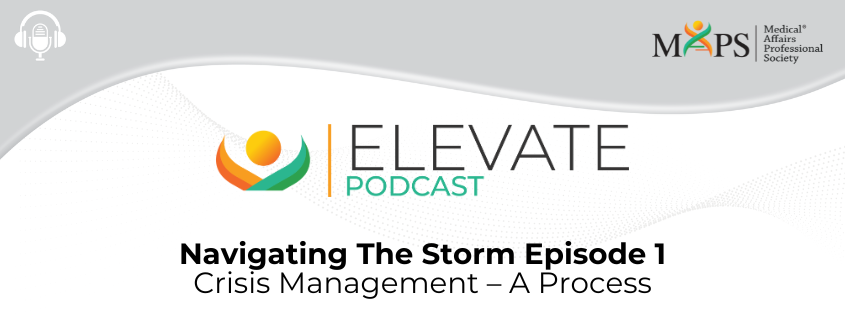This three-part podcast explores how Medical Affairs leaders can navigate and lead through disruption with clarity, structure, and resilience.
This episode defines crisis management as a structured, cyclical process: preparedness, response, recovery, and reflection. We discuss how Medical Affairs plays a unique role in translating uncertainty into strategy, maintaining scientific clarity, and protecting external trust through transparent communication.
Moderator: Fran Paradiso-Hardy
Speaker: Bagrat Lalayan
Following is an automated transcription provided by otter.ai. Please excuse inaccuracies.
00;00;00;00
MAPS
Oh. Welcome to this episode of the Medical Affairs Professional Society podcast “Elevate”. The views expressed in this recording are those of the individuals, and do not necessarily reflect on the opinions of MAPS or the companies with which they are affiliated. This presentation is for informational purposes only and is not intended as legal or regulatory advice. And now for today’s “Elevate” episode.
00;00;33;09
Fran Paradiso-Hardy
Hello everyone. Welcome to Navigating the Storm. The podcast where we explore how Medical Affairs professionals turn moments of uncertainty into opportunities for clarity, strategy and trust. I’m Fran Paradiso-Hardy, Head of Global Medical Communications and Engagement at Astellas Pharma.
00;00;54;18
Bagrat Lalayan
And I am Bagrat Lalayan, Vice President and Head of the Medical Affairs at Legend Biotech. Today’s episode is the first in our three part series on crisis management. We’re starting with a foundation understanding crisis management as a structured cyclical process preparedness, response or recovery and reflection.
00;01;18;29
Fran Paradiso-Hardy
Exactly. And we’re going to explore how Medical Affairs plays a unique role in each of those phases, from translating uncertainty into actionable strategy to ensuring clarity, and finally protecting external trust through transparent communication.
00;01;38;26
Bagrat Lalayan
Fran, I think a lot of people hear crisis management and picture frantic phone calls, emergency meetings, maybe a war room with lots of coffee and charts.
00;01;51;04
Fran Paradiso-Hardy
Right. The high drama image. But in reality, effective crisis management isn’t just reacting to chaos. It’s having a framework so you know what to do before, during and after a crisis.
00;02;08;28
Bagrat Lalayan
Exactly, Fran. And that’s where the cyclical model comes in. Think of it like a loop. Preparedness, response. Then recovery, then reflection. And back to preparedness. Every loop strengthens your ability to handle the next crisis.
00;02;26;03
Fran Paradiso-Hardy
Exactly. And the first step is preparedness. Preparedness is the groundwork. It’s about anticipating a possible crisis, such as a product recall or misinformation spreading online and having a playbook ready.
00;02;44;05
Bagrat Lalayan
That’s right. And in Medical Affairs, preparedness also means building relationships and credibility before you need them. If you have established trust with this healthcare professionals, regulators, patient groups, or your cross-functional colleagues or alliance partners, your communications will carry more weight during the crisis.
00;03;05;03
Fran Paradiso-Hardy
Yes. And don’t forget scenario planning. Running tabletop exercises, creating decision trees, and most importantly, clarifying roles. Who signs off on scientific statements? Who speaks to the media? Who updates the field team and other cross functional partners? These things have to be clear before the clock starts ticking.
00;03;30;05
Bagrat Lalayan
Yes. Very important questions. And when the crisis hits, we enter the response phase. This is where speed and accurate see matter. Most.
00;03;39;04
Fran Paradiso-Hardy
And this is where Medical Affairs shines. Translating complex and sometimes incomplete scientific data into language that different audiences can understand.
00;03;51;23
Bagrat Lalayan
Exactly. That’s crucial, because in a crisis, uncertainty is unavoidable. Medical Affairs helps transform. We don’t have all the data yet into. Here’s what we know now. Here’s what we are doing. And here’s when you’ll hear from us next.
00;04;09;08
Fran Paradiso-Hardy
Exactly. This balances scientific integrity with public reassurance. Transparency builds trust. Even when the news is incomplete or isn’t perfect.
00;04;24;02
Bagrat Lalayan
Correct. So, Fran, once the immediate danger is over, we enter recovery. The goal here is to stabilize operations and rebuild confidence.
00;04;35;12
Fran Paradiso-Hardy
And for Medical Affairs, that might mean updating educational materials. Reengaging with our key opinion leaders or providing detailed follow up data to address lingering inquiries or questions.
00;04;50;01
Bagrat Lalayan
And please remember, recovery isn’t just about restoring the status quo. It’s an opportunity to strengthen relationships and demonstrate resilience.
00;04;59;22
Fran Paradiso-Hardy
Absolutely. Which brings us to the last stage and often the most overlooked reflection.
00;05;08;01
Bagrat Lalayan
Right after the crisis. Take a structured look back. What worked? What didn’t? Did your preparedness plan actually hold up?
00;05;17;26
Fran Paradiso-Hardy
And this is where the cyclical nature kicks in. Reflection actually feeds directly into better preparedness for next time. Document the lessons learned. Update your playbooks and make sure that everyone is trained on these changes.
00;05;33;23
Bagrat Lalayan
Exactly. And if we zoom out, the Medical Affairs role in crisis management is about being the bridge and not the breach. Between clinical development and commercial. But in the crisis management, the true breach between uncertainty and strategy, between scientific facts and practical actions.
00;05;53;23
Fran Paradiso-Hardy
Exactly. And that’s being the guardian of trust in every phase. Medical Affairs upholds transparency, scientific rigor and empathy. That’s what sustains credibility. Long after the headlines fade.
00;06;09;19
Bagrat Lalayan
So, Fran to wrap up, crisis management isn’t about panic. It’s about process preparedness, response, recovery. Reflection. Each stage informs the next.
00;06;22;10
Fran Paradiso-Hardy
And in Medical Affairs, Bagrat. Our job is to keep the science clear, the communication honest and the trust strong.
00;06;30;11
Bagrat Lalayan
So join us next time for episode two, where we’ll explore how to construct and lead an agile, cross-functional crisis management team.
00;06;41;08
Fran Paradiso-Hardy
Until then, Bagrat, stay prepared. Stay clear and stay connected.
00;06;45;16
Fran Paradiso-Hardy and Bagrat Lalayan
Thanks for listening, everyone.





